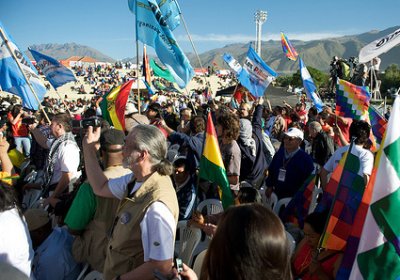More than 150 people packed into a Wollongong university lecture theatre on October 21 for the Wollongong launch of the Zero Carbon Australia 2020 Stationary Energy Plan (ZCA2020).
Launches of the plan in Melbourne and Sydney that attracted about 700 and 1000 people respectively, and on October 15 it won the Mercedes-Benz Australian Environmental Research Award.
The plan is the product of a collaboration between the University of Melbourne Energy Research Institute and Beyond Zero Emissions (BZE).
Environment
More than 100 landowners from the Madang Province of Papua New Guinea have said they want to join a court battle to stop millions of tonnes of mine waste being dumped into the sea, the Ramu Nickel Mine Watch website said on October 17.
The challenge was launched by 37 landowners, with others indicating their intent to join the case.
Despite all the rhetoric on climate change, both the NSW and federal governments consider it acceptable to allow seismic testing and drilling to explore for gas and potentially oil off Australia's east coast.
Despite the potential to develop entire new industries in clean, renewable energy, governments will not or cannot break their addiction to fossil fuels. They have literally placed the entire offshore Sydney Basin on the market for fossil fuel extraction; an area of 6000km², extending from Wollongong to Port Stephens.
No legally-binding agreement to cut greenhouse gas emissions will be made at this year’s big United Nations climate conference in Cancun, Mexico from November 29 to December 10. And that’s just the way the rich nations want it.
Few world leaders are even expected to turn up to the Cancun talks. For months, key players have tried to dampen down public hopes that the summit will mark a shift away from business as usual.
The British Guardian columnist George Monbiot wrote on September 20 that it was time for climate action campaigners to accept the UN process was dead.
Despite carefully-crafted appearances to the contrary, projects like the Extractive Industries Transparency Initiative (EITI) are no solution to the problems that confront the colonised “developing” world.
Endemic corruption, environmentally unsustainable development and spiralling income inequality are inseparable from the process of capitalist global expansion, which EITI and other corporate-funded front organisations only serve to legitimise.
The following call was issued by Canadian-based non-government organisations, community groups and individuals to join the growing global movement for climate justice. It calls for mobilising in the lead-up and during the United Nations climate summit in Cancun, Mexico, over November 27-December 10.
Australia’s big banks would like you to think they care about climate change and the environment. But don’t believe them.
A new report by Greenpeace Australia has revealed the “big four” — Westpac, ANZ, Commonwealth and NAB — are investing billions of dollars in Australia’s dirty coal boom.
Burning coal for energy is Australia’s single biggest contributor to climate change, making more than a third of the country’s greenhouse gas pollution. Australia is also the world’s biggest coal exporter — and the export trade is growing fast.
About 40 people attended the launch of a No New Coal campaign by Safe Climate Perth on October 10. The launch took place as part of the 350.org “global work party” — an international day of action involving more than 7000 events around the world.
As part of the campaign, activists aim to get 10,000 signatures in 10 weeks on a petition opposing new coal developments in Western Australian.
Beginning in April, so-called peace talks have taken place between some conservation groups and timber industry stakeholders about the future of the Tasmanian timber industry. Both sides have painted the talks as a once in a lifetime opportunity to “end the forest wars”.
Environment Tasmania (ET) director Phill Pullinger told the May 13 Australian: “We've had 30 years of worsening trench warfare in Tassie over forests and now is the time and the opportunity to essentially solve the forest conflict — and solve it properly.”
Gippsland unions and community organisations took part in the fourth in a series of “transition jobs seminars”. The seminar took place on October 13 under the auspices of the Gippsland Trades and Labour Council (GTLC) and the Royal Melbourne Institute of Technology (RMIT).
It dealt with the region’s current skills base in brown-coal mining, dairy and other industries, and the sort of training needed to skill workers for environmentally sustainable production.
The “Switch off Hazelwood, Switch on Renewable Energy” protest targeted Australia’s dirtiest coal-fired power station, in Victoria’s Latrobe Valley, on October 10. It was successful but muted in contrast to its predecessor in 2009.
The mood was no less festive, but this year, there was no climate camp, no mass actions and no arrests.
The deluge of rain hitting south-east Australia has broken the 10-year drought that brought the Murray Darling Basin and many farming communities to the brink of disaster.
A few months of wet weather have brought the wetlands back to life. The rivers are flowing again, and farmers might even be able to harvest a bumper crop if they can beat the mass locust hatchings.
- Previous page
- Page 275
- Next page











